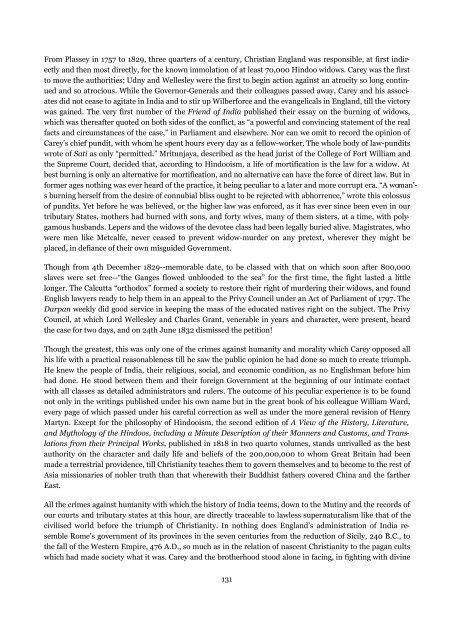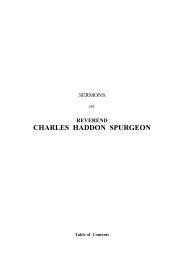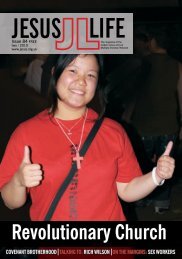Life of William Carey by George Smith - The Jesus Army
Life of William Carey by George Smith - The Jesus Army
Life of William Carey by George Smith - The Jesus Army
You also want an ePaper? Increase the reach of your titles
YUMPU automatically turns print PDFs into web optimized ePapers that Google loves.
From Plassey in 1757 to 1829, three quarters <strong>of</strong> a century, Christian England was responsible, at first indirectly<br />
and then most directly, for the known immolation <strong>of</strong> at least 70,000 Hindoo widows. <strong>Carey</strong> was the first<br />
to move the authorities; Udny and Wellesley were the first to begin action against an atrocity so long continued<br />
and so atrocious. While the Governor-Generals and their colleagues passed away, <strong>Carey</strong> and his associates<br />
did not cease to agitate in India and to stir up Wilberforce and the evangelicals in England, till the victory<br />
was gained. <strong>The</strong> very first number <strong>of</strong> the Friend <strong>of</strong> India published their essay on the burning <strong>of</strong> widows,<br />
which was thereafter quoted on both sides <strong>of</strong> the conflict, as “a powerful and convincing statement <strong>of</strong> the real<br />
facts and circumstances <strong>of</strong> the case,” in Parliament and elsewhere. Nor can we omit to record the opinion <strong>of</strong><br />
<strong>Carey</strong>’s chief pundit, with whom he spent hours every day as a fellow-worker. <strong>The</strong> whole body <strong>of</strong> law-pundits<br />
wrote <strong>of</strong> Sati as only “permitted.” Mritunjaya, described as the head jurist <strong>of</strong> the College <strong>of</strong> Fort <strong>William</strong> and<br />
the Supreme Court, decided that, according to Hindooism, a life <strong>of</strong> mortification is the law for a widow. At<br />
best burning is only an alternative for mortification, and no alternative can have the force <strong>of</strong> direct law. But in<br />
former ages nothing was ever heard <strong>of</strong> the practice, it being peculiar to a later and more corrupt era. “A woman'-<br />
s burning herself from the desire <strong>of</strong> connubial bliss ought to be rejected with abhorrence,” wrote this colossus<br />
<strong>of</strong> pundits. Yet before he was believed, or the higher law was enforced, as it has ever since been even in our<br />
tributary States, mothers had burned with sons, and forty wives, many <strong>of</strong> them sisters, at a time, with polygamous<br />
husbands. Lepers and the widows <strong>of</strong> the devotee class had been legally buried alive. Magistrates, who<br />
were men like Metcalfe, never ceased to prevent widow-murder on any pretext, wherever they might be<br />
placed, in defiance <strong>of</strong> their own misguided Government.<br />
Though from 4th December 1829--memorable date, to be classed with that on which soon after 800,000<br />
slaves were set free--“the Ganges flowed unblooded to the sea” for the first time, the fight lasted a little<br />
longer. <strong>The</strong> Calcutta “orthodox” formed a society to restore their right <strong>of</strong> murdering their widows, and found<br />
English lawyers ready to help them in an appeal to the Privy Council under an Act <strong>of</strong> Parliament <strong>of</strong> 1797. <strong>The</strong><br />
Darpan weekly did good service in keeping the mass <strong>of</strong> the educated natives right on the subject. <strong>The</strong> Privy<br />
Council, at which Lord Wellesley and Charles Grant, venerable in years and character, were present, heard<br />
the case for two days, and on 24th June 1832 dismissed the petition!<br />
Though the greatest, this was only one <strong>of</strong> the crimes against humanity and morality which <strong>Carey</strong> opposed all<br />
his life with a practical reasonableness till he saw the public opinion he had done so much to create triumph.<br />
He knew the people <strong>of</strong> India, their religious, social, and economic condition, as no Englishman before him<br />
had done. He stood between them and their foreign Government at the beginning <strong>of</strong> our intimate contact<br />
with all classes as detailed administrators and rulers. <strong>The</strong> outcome <strong>of</strong> his peculiar experience is to be found<br />
not only in the writings published under his own name but in the great book <strong>of</strong> his colleague <strong>William</strong> Ward,<br />
every page <strong>of</strong> which passed under his careful correction as well as under the more general revision <strong>of</strong> Henry<br />
Martyn. Except for the philosophy <strong>of</strong> Hindooism, the second edition <strong>of</strong> A View <strong>of</strong> the History, Literature,<br />
and Mythology <strong>of</strong> the Hindoos, including a Minute Description <strong>of</strong> their Manners and Customs, and Translations<br />
from their Principal Works, published in 1818 in two quarto volumes, stands unrivalled as the best<br />
authority on the character and daily life and beliefs <strong>of</strong> the 200,000,000 to whom Great Britain had been<br />
made a terrestrial providence, till Christianity teaches them to govern themselves and to become to the rest <strong>of</strong><br />
Asia missionaries <strong>of</strong> nobler truth than that wherewith their Buddhist fathers covered China and the farther<br />
East.<br />
All the crimes against humanity with which the history <strong>of</strong> India teems, down to the Mutiny and the records <strong>of</strong><br />
our courts and tributary states at this hour, are directly traceable to lawless supernaturalism like that <strong>of</strong> the<br />
civilised world before the triumph <strong>of</strong> Christianity. In nothing does England’s administration <strong>of</strong> India resemble<br />
Rome’s government <strong>of</strong> its provinces in the seven centuries from the reduction <strong>of</strong> Sicily, 240 B.C., to<br />
the fall <strong>of</strong> the Western Empire, 476 A.D., so much as in the relation <strong>of</strong> nascent Christianity to the pagan cults<br />
which had made society what it was. <strong>Carey</strong> and the brotherhood stood alone in facing, in fighting with divine<br />
131
















